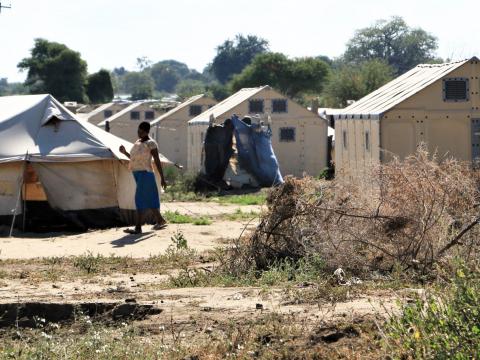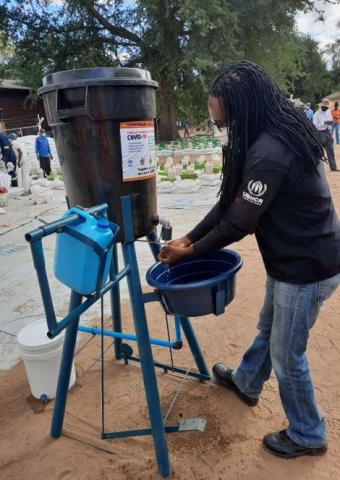World Vision assists with COVID-19 preparedness at Tongogara Refugee Camp in Chipinge, Zimbabwe

Driving up the 20-kilometre dusty road to the camp, we expected to see a large fenced area lined with white United Nations High Commissioner for Refugees (UNHCR) emergency housing tents - typical of media images of refugee camps. Tongogara Refugee Camp which is found in the eastern side of Zimbabwe in a district called Chipinge is nothing like you would expect. As we enter the camp, it becomes apparent that this has ceased to be a temporary hideout for refugees but rather a permanent place of residence for many of them. Mud huts, brick houses, tuck-shops and small businesses line the sides of the streets as we drive up – these families have settled here.
The camp has been in existence since 1983 and was established by the Government of Zimbabwe as a result of civil unrest in neighbouring Mozambique. The camp, which was originally designed to cater for a maximum of 3,000 people is the only surviving refugee camp in Zimbabwe and now houses 14,300 people. The majority of its residents came into the country as a result of the unrest in the Great Lakes Region. The refugee camp boasts the largest primary and secondary schools in the country with more than 3,600 and 2,000 students respectively.
Many people in Zimbabwe are concerned about the dilapidated health system in the country and the devastating effect that the spread of the COVID-19 virus could have on the nation. As the virus spreads across continents, World Vision is concerned about these vulnerable refugee populations in Zimbabwe who already face humanitarian crises. In cramped camp settings, measures to avoid transmission of the virus, such as physical distancing and frequent hand-washing, would understandably be difficult to implement. Crowded spaces like refugee camps are a hotbed for the rapid spread of the virus and as the need for more water rises, and residents, particularly children, become even more vulnerable to the pandemic- we were curious to find out how they were coping.
COVID-19 preparedness within the camp
UNHCR is the leading agency at the camp and partners with International NGOs such as World Vision to assist in the running of the camp. In January 2020, World Vision began implementing projects focusing on Water, Sanitation and Hygiene (WASH) and Livelihoods. Since the outbreak of the COVID-19 pandemic in Zimbabwe, the organisation scaled down the Livelihoods activities and focused mainly on Water, Sanitation & Hygiene (WASH). This is because the Ministry of Health & Child Care categorised the Tongogara Refugee Camp as a "high-risk area" for a potential outbreak of COVID-19. To prepare for this, the UNHCR and partners in the camp have constructed an isolation facility, with World Vision leading in ensuring that all water supplies for the isolation centre are installed and adequate in the event of an outbreak.
Manicaland has been identified by the Government of Zimbabwe as a high-risk zone because of the high traffic in the many border towns. Additionally, the camp has a free movement policy which was originally put in place to assist with the integration of refugees within host communities- at this point, this increases their exposure to COVID-19.
“Since the beginning of the national lockdown in April 2020, we have received 13 new arrivals and they have found refuge at the camp and the Government is geared to receive more people of concern despite the COVID-19 threat posed by such migrants,” said Johannes Mhlanga, Tongogara Refugee camp administrator.
In response to COVID 19 and also under their current WASH programme for the camp, World Vision is installing solar-powered piped water schemes for five new boreholes. Of these, two will be at the camp while the other three are within host communities, providing water to two primary schools and a local clinic.
World Vision is also working on increasing the number of water points and taps from 97 to 388. This is meant to decongest water points and to improve on social and physical distancing. Further, the organisation is providing prompt services on repair and maintenance of 15 boreholes located in different sections of the camp. These serve as back-up to ensure water provision in the camp is guaranteed daily.

Collaborating with UNHCR, World Vision has distributed fifty 85-litre foot-operated hand-washing facilities within the camp. Hand-washing stations will be installed at designated public places, entry points to offices, schools and clinics within the camp. Also, the Chipinge District COVID-19 Task Force will get four water stations which they will distribute to the district hospital, government complex and council offices in order to promote hand-washing which vital in preventing the spread of COVID-19. The UNHCR, Jesuits Refugee Services and Government are in the process of producing 14,000 face masks for 12,000 refugee camp occupants.
All partners in the camp are scaling up COVID-19 awareness campaigns through Information, Education and Communication (IEC) materials and mobile roadshows. World Vision working with UNHCR, the Government, Terres De Hommes, Jesuits Refugee Services and Childline through the Camp Administrator’s office, and have successfully hosted Diamond FM radio station which conducted a mobile roadshow within the camp and the host community to help spread preventative messages to communities in the camp.
Although World Vision is doing its best to ensure that water supply in the camp remains constant and adequate to reduce the spread of the virus, other real issues as a result of the virus, are still present amongst the persons of concern. Dano, an 11-year-old girl born in Zimbabwe after her family fled the Democratic Republic of Congo, is among the thousands of refugee children who have been living under a complete lockdown imposed by the Government since the beginning of April. She tells us about how the pandemic and the unforeseeable lift on the lockdown is causing her much anxiety as a student who is due to write national examinations in November 2020. She speaks of how she and other students lack resources to adequately study alone at home, and of how online classes are not a reality for them and many other children in the country. But despite all this, Dano is smiling and tells us that she wants to become a lawyer, thanking World Vision for bringing more water points closer to their homes. She adds that when schools do open, having taps nearer to their homes will mean less congestion at the communal water points and more time for her to prepare for and get to school on time.
Further down the road, we meet Benjamin. He is part of the pig-keepers association which supports 42 families within the camp. He says the piggery was formed to assist families who were already keeping pigs, as well as to decongest the camp of pigs. This livelihoods project was supposed to help these families to generate income but since the lockdown began, they have lost 140 pigs from a total of 400. Shops have been closed and getting feed for the pigs has therefore been a challenge for these farmers. At the time of our visit, World Vision was in the process of assisting the situation, and Benjamin and his fellow farmers say they are hopeful because World Vision has taken over the livelihoods projects in the camp.
We ask one of the teachers what their biggest fear is about COVID 19 and living in the camp. "An outbreak in the camp was one of my worst fears when I heard about this pandemic - how would we manage to implement those strict health guidelines given our circumstance? But since the isolation centre was set up and World Vision has increased our water supply, I sleep better,” he said.